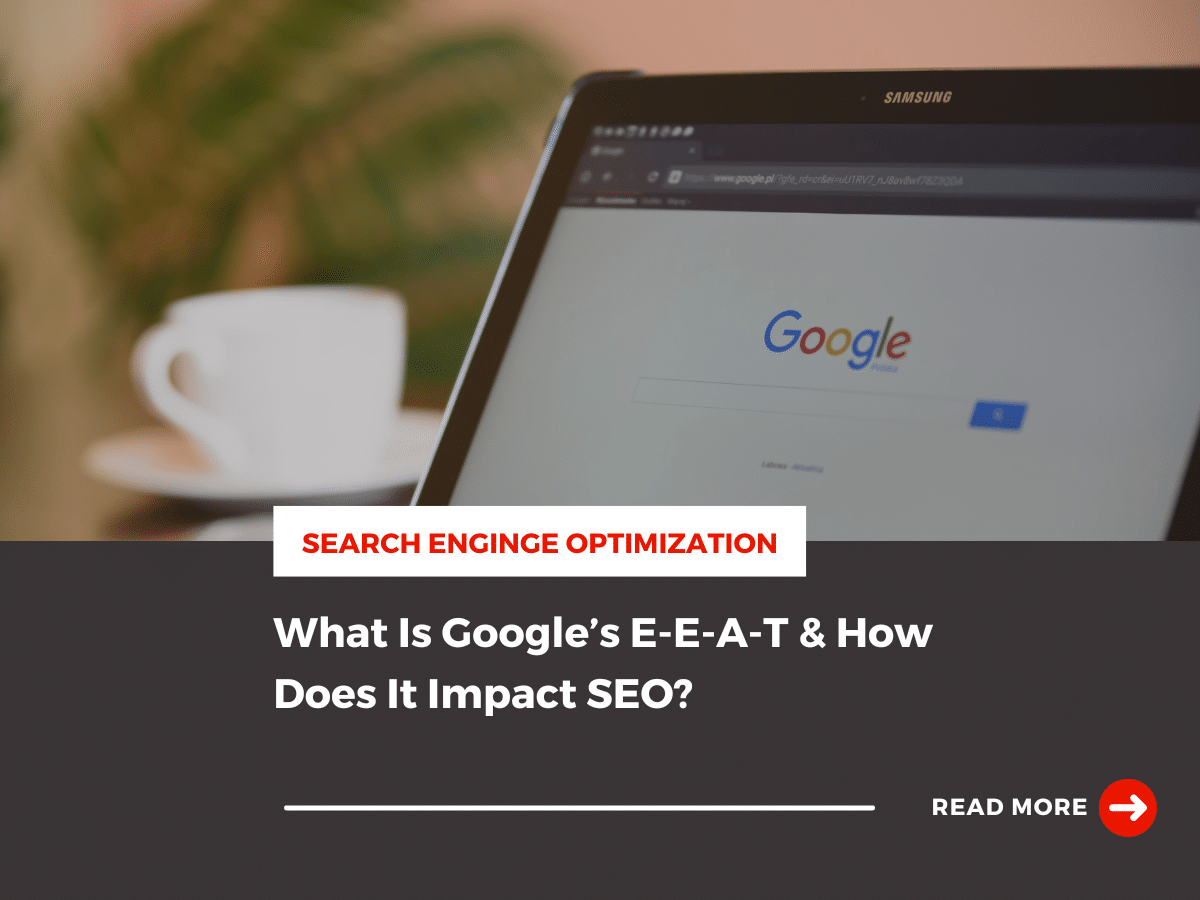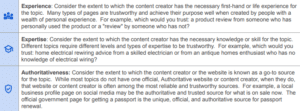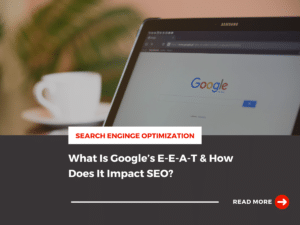You’ve likely grown to trust the first few sources that rank in the SERPS for medical questions, historical facts, or news about upcoming events. However, have you ever wondered what Google looks for when deciding what is and isn’t worthy of making it on the first page of the search results? It’s more complex than you might think.
Google aims to show searchers trustworthy, reliable content, and they can do this with the E-E-A-T guidelines. This is a set of SEO guidelines used during search engine evaluations to ensure the content you see is credible and correct. While E-E-A-T is an integral part of the content creation process that every writer and business needs to consider, it’s not necessarily a ranking factor.
We’re here to walk you through the importance of Google’s E-E-A-T and encourage you to keep this quality rater guideline top of mind when creating content.
What is Google’s New E-E-A-T?
The E-A-T guidelines first appeared in Google’s Search Quality Rater Guidelines. This is a 168-page guide published back in 2014. The search engine uses these guidelines to evaluate the search quality of content and provide businesses with a general understanding of what they need to do to improve their content strategy.
Google’s recent December update to the Quality Rater Guidelines changes E-A-T to E-E-A-T. The new acronym stands for Experience, Expertise, Authoritativeness, and Trustworthiness.
Here’s what they’re looking for:
Experience
With the addition of experience, content quality can now be evaluated by understanding the first-hand “experience” the content creator has with the topic. Experience can even extend into Google’s “YMYL” (Your Money or Your Life) topics. Google uses this acronym for any topics that may significantly impact your health, finances, safety, and/or well-being.
Expertise
The expertise factor looks at the first-hand experience of the creator or the author of the content. Google wants to see if the writer is a subject expert with the knowledge or the skills to write content on the topic. They’re looking at the article, blog, or landing page on a content level, not at the website level.
Authoritativeness
Authority is all about your website’s reputation. If individuals go to your website for information on a particular subject, you likely have some authority to speak on a topic.
Think about where you go for most of your information. If you’re looking for an actor’s birthday or more information on a historical event, you probably head to Wikipedia. If you’re looking for data-backed findings on recent studies, you might choose a source like Harvard Medical School.
Trustworthiness
Lastly, Google is looking to see how accurate the information on your website is. They want to know the legitimacy of your claims and ensure the information provided is clear, concise, and accurate. One way that Google looks for this is by looking not at the content but at the information about who is behind the published content.
They want to know that your business is legitimate and that there is a real writer behind your blogs or articles. They want factual content that is backed by data and trustworthy sources.
How Google E-E-A-T Guidelines Impact Rankings
Even with all of this in mind, E-E-A-T isn’t as big of a ranking factor as you might think. The E-E-A-T guidelines ensure all of the information that comes up in the search engine results is what the reader is looking for. It’s a great quality control tool that Google uses to ensure everything published is trustworthy, helpful, and relevant. Without E-E-A-T, you might start seeing blogs and content that doesn’t align with what you’re looking for.
However, E-E-A-T doesn’t necessarily impact all content the same way. It’s not a tangible or measurable way of looking at content on a blog page.
Let’s break it down.
Let’s say you were searching for photos of cute puppies. E-E-A-T wouldn’t impact the search results because cute puppies are subjective, and it’s hard to define how E-E-A-T would impact this type of content. (Even though we can all agree, puppies are cute!)
However, Google E-E-A-T guidelines would be more important if you were searching to see what types of over-the-counter medication you give your dogs. Without E-E-A-T, you might start seeing articles written by writers that aren’t trustworthy and don’t know what they’re talking about. Which can lead you to a world of trouble.
For any query looking for advice, feedback, or direction: Expertise, authoritativeness, and trustworthiness are a top priority for Google. Even though Google can’t be held liable for the information you find on any given website, they can do their part to ensure that every source you find falls is approved using E-E-A-T.
It’s important to note that E-E-A-T isn’t an algorithm or a scoring system. There are no technical ways to see your content meets the E-E-A-T standard or a clear direction to improve your E-E-A-T score. However, there are additional steps you can take as a content creator to ensure your website is demonstrating E-A-T.
How To Improve Your Content for Google E-E-A-T
Understand Your Audience
Google wants brands to write for the reader, not the search engine. When you take the time to step into your audience’s shoes, you can make your content more user-friendly and inviting.
Remember to always take a people-first approach to content. This is the best way to ensure your content is seen as trustworthy and legitimate.
Aim For Quality, Not Quantity
When it comes to creating content, sometimes less is more. If you want to meet the E-E-A-T guidelines, you’ll want to start rethinking your content strategy and finding new ways to add value to your content. The higher the quality of the work, the better the results.
You’ll also want to take the time to look back and review the content you’ve published to ensure everything is up to date and nothing has changed. Regularly reviewing, updating, and adjusting your content based on new findings and research is a great way to establish your authority online and give readers a reason to trust you as a reliable source.
Utilize Backlinks
Backlinks are a great tool to help you add authority and credibility to your content. When building backlinks to your content, you’ll want to ensure they are relevant to the content you’re creating.
The more high-quality backlinks you gain, the more authority your site will have. Always look for more backlink opportunities by providing reputable and helpful information other websites find value in.
Always Include Author Bylines
Author bylines are a great tool to inform your audience who the writer is behind the content. They are also used by search engines to know who is creating the content and how reputable the source is. Without an author byline, the content may not have the authority to rank in the SERP.
Invest in Website Security
Would you trust a website for information if it wasn’t safe and secure? Probably not. This means a great way to improve your E-E-A-T score is by prioritizing your website security. If you follow all the correct HTTPS protocols and ensure your website is secure with an SSL certificate, your website will be more reputable. Site security and accessibility also have an impact on your site’s organic performance and should be a part of your technical SEO strategy.
Improve Accessibility
All of the contact details on your website should be clear and concise. There shouldn’t be any missing elements that may cause Google to rethink its trustworthiness. Make sure you have an address, phone number, and other location-based details that will boost your local SEO standings. Stay as transparent as possible to show Google that your business is trustworthy and reputable.
Focus on Reviews
Customer reviews are a great way to gain authority and show Google that you’re a reputable source people rely on. Try to get more positive reviews across the board on Google, Better Business Bureau, Facebook, and your website. Every positive review helps you maintain your reputation and get more eyes on your brand.
Team Up With SEO Experts
Navigating the ins and outs of SEO and the E-E-A-T guidelines can be challenging. With our expertise, you can gain the reputation you need to connect with customers and improve your rankings over time. We’ll help you overcome challenges, find places to improve and give you that competitive edge you need to build a positive reputation online.





